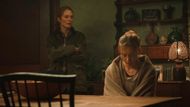There’s no warning loud enough to prepare you for the silence that Echo Valley delivers. Not the kind that soothes, but the kind that chokes. The kind that settles over a stable in rural Pennsylvania and weighs on every breath, every hoofstep, every word left unsaid between a mother and her daughter.
Echo Valley opens slowly, methodically, like a wound left open, seeping pain into every corner of daily life. In just the first twenty-five minutes, we meet Kate, a woman separated from the world and from herself, trying to hold on to the only place that still feels like hers. And we meet Claire, her daughter, her grief, her mirror, arriving in the dead of night with eyes full of secrets and hands full of threat.
The cruelty is quiet and intimate. It pulses in the way Claire grabs her mother's hair and in the way she threatens a dog just to twist the knife. It lives in the collapse of safety, in how quickly the familiar becomes dangerous. And we watch it unfold with clenched teeth, because every frame demands our attention. Every silence screams.

Rhythm without relief
Morning arrives not with light, but with routine. The frame returns to Kate’s bare foot reaching for the floor, always from the same angle, as if the camera itself has accepted that nothing really changes here. She wakes, not because she rested, but because the horses need her. Because this place runs on rhythm, and grief obeys rhythm like muscle memory.
This repetition is no accident. The cinematography of Echo Valley echoes her days like a looped prayer with no response. Her body moves, but her spirit stays locked in the same stable of loss. And every time the camera sinks to the level of her feet, we are reminded that in Echo Valley, healing isn’t about transformation. It’s about endurance.
Interlude with wine and music in the Echo Valley
Like a freckle of sun through a barn door long shut, joy enters Echo Valley gently, without warning. It arrives in the form of a friend, bringing warmth that settles slowly and deeply. A bottle of wine. Familiar music. Two women sharing a night that feels borrowed from a life they almost forgot.
The moment asks for nothing. It simply allows. Kate loosens. She laughs. She dances. The weight she carries shifts, made lighter by presence, by memory, by the kind of company that doesn’t demand explanations.
For a brief span of hours, the stable transforms. No longer just a place of labor or grief, it becomes shelter in the truest sense. Not an escape, but a return. To breathe, to self, to something tender and unbroken. Echo Valley gives Kate—and us—this little respite.
By the end of the night, Kate is drunk. Not destructively, but deeply. The kind of drunk that blurs pain without denying it. And her friend, with gentle familiarity, guides her to bed. There is no need for words. Just care, and a rare, fleeting softness.
Grief on repeat
Some losses whisper. They hum through static, replay through headphones, and haunt the corners of daily routine. Kate listens to old messages from her wife with a stillness that says more than any sob could. It’s not nostalgia. It’s ritual. A tether to something already gone but still echoing in her chest.
That first image, the body plunging into dark water, lingers like an undertow beneath everything. Even as Kate returns to work, guiding horses and students with calm authority, the grief stays close. The riding lessons bring a kind of respite, a shallow breath after being metaphorically underwater for too long, but the audience already senses what remains ahead. The film still holds over an hour of quiet devastation in reserve.
And so, even in moments of calm, the heart braces. Echo Valley teaches early that peace is never permanent. Every quiet carries the weight of what’s coming.
A woman pushed past the edge
There comes a moment when Kate stops absorbing and starts acting, and not as a mother, not as a grieving widow, not as a woman caught in someone else’s spiral, but as someone who has nothing left to lose. The shift is quiet. Measured. She moves through decisions with the same stillness she used to endure them. But this time, the stillness is a shield. A blade. A choice.
Echo Valley doesn’t paint her as a hero. It doesn’t romanticize the burden she takes on. It simply shows her reaching the threshold where survival becomes strategy. And as the landscape around her grows colder and sharper, so does she.
In the end, the film circles back. Claire returns, face unreadable, carrying nothing and everything. The door stands between them like a question with no answer. And the screen fades before we can know if Kate opens it.
After everything she’s carried, buried, and endured, the film chooses not to show us what she does next. It hands us the silence again.
Echoes that never settle
Echo Valley doesn’t offer catharsis. It offers weight. And it lets that weight linger in your chest long after the screen goes black. The silence it began with returns in the final shot, but something has shifted. We no longer see Kate as someone waiting. She is choosing. And that changes everything.
Echo Valley does not tell us a story about forgiveness or redemption, but containment. Echo Valley's story is about how much a person can hold before she decides where her line ends and who gets to cross it. The title isn’t metaphor. It’s literal. These are echoes. Painful, persistent, unrelenting. And they do not fade.
For its quiet ferocity, masterful restraint, and the kind of performance that lets silence carry more than words ever could.
Would you let her in?
Rating with a touch of flair: 4.5 out of 5 hooves on burnt ground.
Love movies? Try our Box Office Game and Movie Grid Game to test your film knowledge and have some fun!
